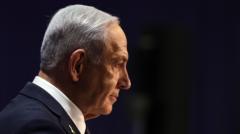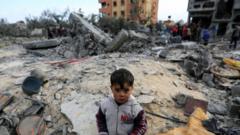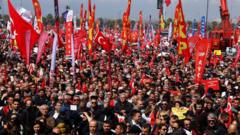As the memories of the pro-democracy protests ebb into history, many Hongkongers are grappling with the loss of their once-vibrant activism. Kenneth, a former protester, wanders through Victoria Park—a once pulsating hub for political gatherings—now silenced under Beijing's heavy-handed national security measures. The historic 2014 Umbrella Movement ignited a decade of fighting for democratic values, leading to mass protests in 2019 against an extradition bill. However, as punitive laws took effect, activists like Kenneth have seen their community change dramatically.
**Echoes of Resistance: Hong Kong's Protest Legacy in the Wake of Suppression**

**Echoes of Resistance: Hong Kong's Protest Legacy in the Wake of Suppression**
A reflection on the past decade of pro-democracy protests in Hong Kong and the memories of those involved amid an atmosphere of fear and repression.
Some, like Chan Kin-man, have left for exile in Taiwan while others, such as Joshua Wong and Benny Tai, face prison sentences in Hong Kong. The city's once-diverse language landscape is shifting, with Mandarin increasingly dominant in public spaces. Despite the absence of visible protests, memories persist, with citizens quietly rallying to preserve their identity and culture. This ongoing struggle to remember a freer past amidst a repressive regime encapsulates the indomitable spirit of Hongkongers—an affirmation that their fight for democracy is far from forgotten.
This haunting transition from a city of vibrant resistance to subdued compliance continues to evoke deep emotion and introspection among those who remain connected to Hong Kong's protest legacy, revealing a parallel narrative of loss, hope, and resilience.
As Kenneth walks past places embedded with personal and collective memories—the PolyU, where battles for democracy raged, and the sites of past protests—he reflects on the evolution of a city once defined by its outspoken defiance against oppression. While many have felt compelled to leave, a sense of attachment lingers, spurring efforts to shield their cultural roots from imminent erasure. Others, like Kasumi Law, who now resides in the UK, battle homesickness and nostalgia while striving to educate their children about their heritage. Her daughter's assertion of identity embodies the poignant tension of exile and connection to a land increasingly overshadowed by the realities of totalitarian control.
Ultimately, the shrinking space for dissent in Hong Kong is a stark reminder of the fragility of democratic ideals, underscoring the necessity of safeguarding the memories and values that characterize its unique identity, even as external pressures mount to conform. In this state of quiet resistance, memories of protest continue to reverberate, creating an enduring dialogue between past aspirations and present challenges.
This haunting transition from a city of vibrant resistance to subdued compliance continues to evoke deep emotion and introspection among those who remain connected to Hong Kong's protest legacy, revealing a parallel narrative of loss, hope, and resilience.
As Kenneth walks past places embedded with personal and collective memories—the PolyU, where battles for democracy raged, and the sites of past protests—he reflects on the evolution of a city once defined by its outspoken defiance against oppression. While many have felt compelled to leave, a sense of attachment lingers, spurring efforts to shield their cultural roots from imminent erasure. Others, like Kasumi Law, who now resides in the UK, battle homesickness and nostalgia while striving to educate their children about their heritage. Her daughter's assertion of identity embodies the poignant tension of exile and connection to a land increasingly overshadowed by the realities of totalitarian control.
Ultimately, the shrinking space for dissent in Hong Kong is a stark reminder of the fragility of democratic ideals, underscoring the necessity of safeguarding the memories and values that characterize its unique identity, even as external pressures mount to conform. In this state of quiet resistance, memories of protest continue to reverberate, creating an enduring dialogue between past aspirations and present challenges.























